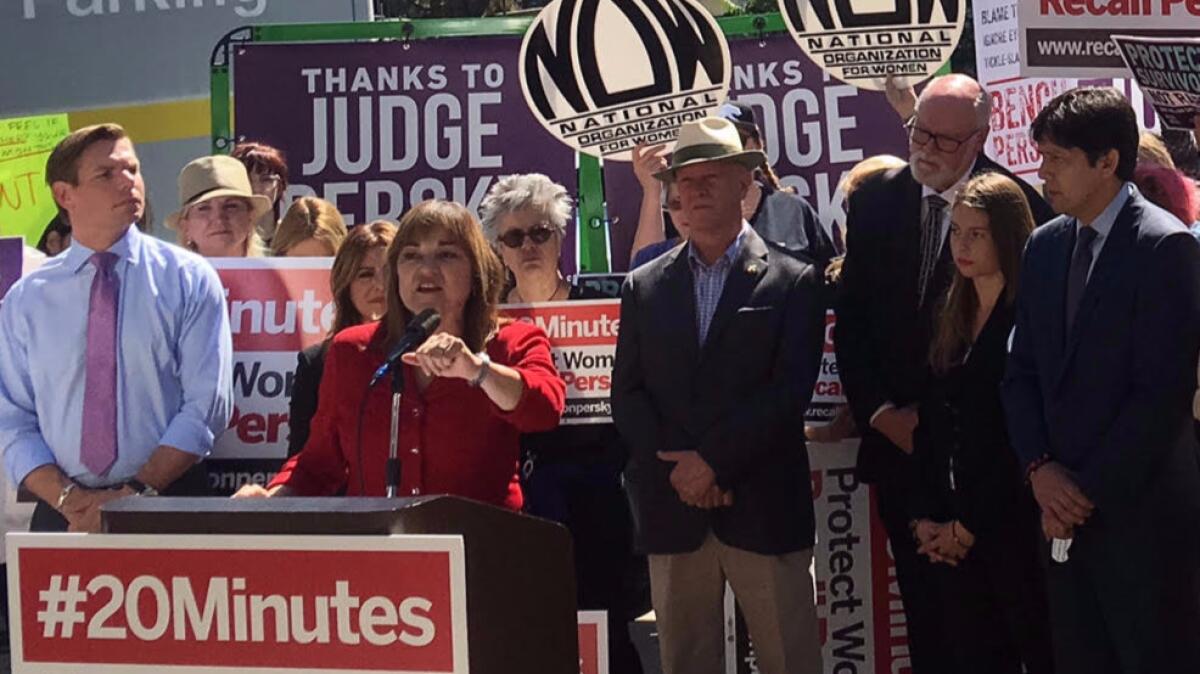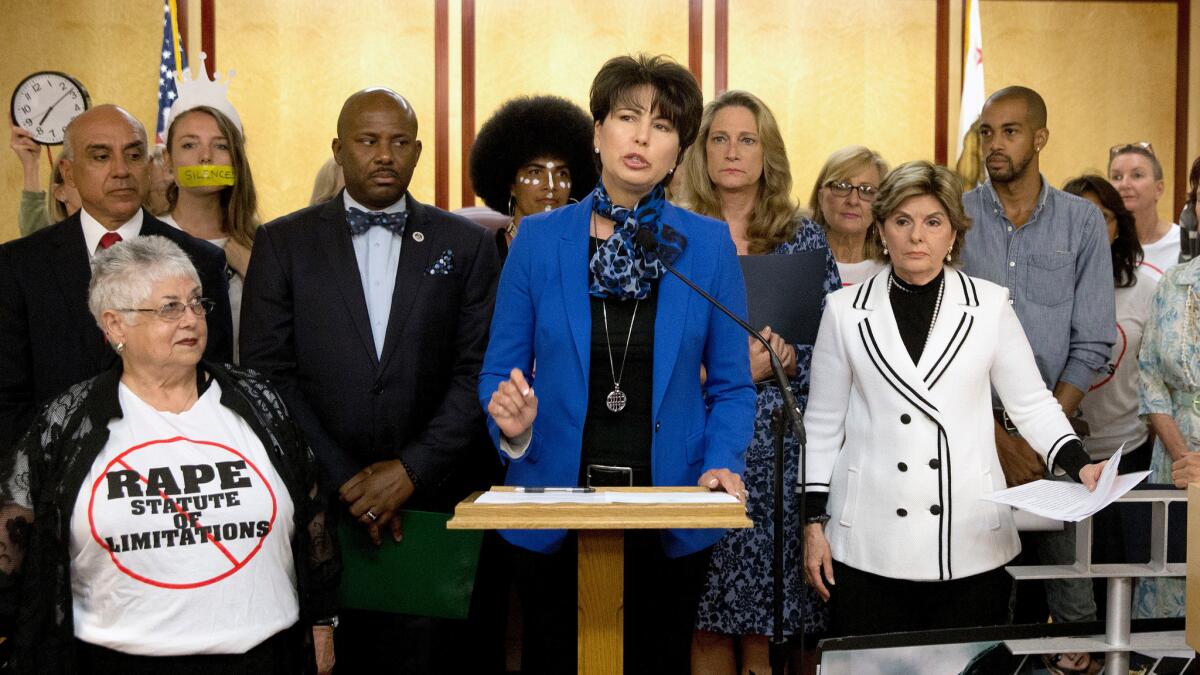Heated debate over tougher punishment for sex crimes as some worry it could unfairly affect California’s minorities

Reporting from Sacramento — Outside the Santa Clara County Jail this month, U.S. Senate candidate Loretta Sanchez joined other political leaders in calling for the ouster of Santa Clara County District Judge Aaron Persky, who attracted widespread criticism over the lenient sentence he handed down to former Stanford swimmer Brock Turner.
She also made another appeal — that Gov. Jerry Brown sign Assembly Bill 2888, which would impose mandatory minimum sentences for offenders like Turner, who have been convicted of sexually assaulting someone who is unconscious or intoxicated.
“That bill must be signed,” Sanchez said. “It would ensure the incarceration of violent sexual predators.”
High-profile cases have spurred a number of bills now before Brown, many of which like the proposal championed by Sanchez, would provide tougher penalties and repercussions against defendants in sex crimes. But their approval is not an easy task at a time when California and a number of advocacy groups and associations are reevaluating the effectiveness of strict punishment policies.
Opponents to the legislation say they are not against holding sex offenders accountable. They say they are against proposals that continue to stack the deck against poor and minority offenders in a system they believe already is unequal in its treatment of those offenders.
“The criminal justice system is not able to address widespread social problems, and when we attempt to do so, it hurts the people with the least power,” said Margo George, co-chair of the legislative committee under the California Public Defenders Assn.
For years, lawyers and victims advocates said, getting tough on sexual assault has meant tougher repercussions for abusers. George, who has been a public defender since 1986, said she once was one of thousands of feminists across the country who fought for harsher punishment against sex offenders when crimes against women were trivialized in culture and society.
Feminist movements first brought attention to domestic violence and sexual assault as early as the 1930s, erupting again in the 1960s and 1990s. But as tough-on-crime policies ramped up in California through legislation and voter initiatives in the ’80s and ’90s, definitions of sex crimes expanded — as did the severity of their consequences.
Now, the Black Lives Matter movement is prompting new discussions on criminal justice reform, pushing issues of race and class to the fore. And public policy analysts, advocates and lawyers, like George, say that through their work over the past three decades, they have come to realize that incarceration cannot be the primary solution to combat sexual assault.
Local and federal law enforcement statistics have shown domestic and sexual violence occur across lines of gender, race and class. But the law, some public defenders and analysts argue, often is unevenly applied against black and Latino men with little or no legal representation, harming families in communities already wracked by gun and gang violence.
Sujatha Baliga, vice president of the research nonprofit Impact Justice, said inherent biases in the criminal justice system also work against survivors of color, who she said are not as likely as white victims to have their claims of abuse investigated.
Baliga, whose family emigrated from India, said she has firsthand experience struggling with the system. When her late father sexually assaulted her as a child, she said, she did not report the abuse, fearing negative criminal and immigration consequences for her entire family.
Like other survivors of color, Baliga said, she thought the laws put in place to help her were driving her away from a system she did not trust.
“Every time we ratchet up the possibility of prosecution and of longer sentences, the more we push survivors who are disinclined to engage with the system further into darkness,” she said.
The shift in attitude comes as the state is undertaking a broader effort to move away from a focus on prison sentences, most notably after a 2009 federal court decision found that crowding at state prisons had risen to dangerous levels and led to a violation of the inmates’ constitutional protection against “cruel and unusual” punishment.
As Brock Turner is released, politicians demand ouster of judge in Stanford rape case »
Laws written at the state Capitol or approved at the ballot box since have sought to unravel parts of the state’s mandatory sentencing regime, and Brown has been vocal against bills that create new crimes. His closely watched November ballot measure would allow some inmates serving time for nonviolent crimes to more quickly become eligible for parole.
This year, the rethinking of crime and punishment ran headfirst into the effort in Sacramento to get tough on sexual assault, as momentum to combat sexual violence on college campuses has again accelerated.
Also on the governor’s desk is Senate Bill 813, filed in the wake of sexual assault allegations against comedian Bill Cosby, which would remove the statutes of limitations on certain sex crimes.
Another bill, AB 1708, would increase the penalties for sex traffickers and buyers.
All three of the sex crimes bills sailed through both the state Assembly and Senate with little opposition. Lawmakers, prosecutors and law enforcement officials said California needs to remain tough on sex offenders and railed against a justice system they said blames victims for sexual assault, fails to keep women safe and is biased toward the LGBT community.

AB 2888 would close a loophole that has long existed in the sentencing guidelines, Assemblywoman Nora Campos (D-San Jose) said.
Sex crimes scar victims for life and are violent offenses about power and control, she said.
“These crimes are very different from robbing a grocery store,” she said.
San Bernardino Dist. Atty. Michael Ramos said strong laws against rape such as SB 813 are needed to help prosecutors hold offenders responsible.
“We still have to prove our case beyond a reasonable doubt in court — whether it happened a day or a year ago,” he said.
But Assemblywoman Cristina Garcia (D-Bell Gardens), who authored pending legislation to expand the definition of rape, was the lone member of 77 in the Assembly to vote against the other Turner bill implementing mandatory punishment.
“What we know now is that mandatory sentencing laws become a ceiling for people of privilege and a floor for people of color,” she said.
The American Civil Liberties Union spoke out against the Cosby and Turner bills and was the only opponent of a proposal that would allow young human trafficking victims to testify in cases through closed-circuit televisions.
Natasha Minsker, director of the ACLU of California Center for Advocacy and Policy, said the bills hurt vulnerable populations by continuing “a pattern of higher and higher penalties for sex offenders, broader definitions of what is a sex crime, removing due process protections that apply in the trials of sex cases and making it easier to convict people with harsher consequences,” she said.
Some groups that traditionally have supported legislation to combat sexual assault have refrained from taking a position, saying they are working to put communities of color at the center of their conversations. The state’s two largest coalitions against domestic violence and sexual assault, including more than 1,000 survivors, advocates, organizations and individuals, did not take any stance on sentencing bills as they begin to look at other forms of intervention and rehabilitation.
Leaders with the California Coalition Against Sexual Assault and the California Partnership to End Domestic Violence said that in historically marginalized communities, families already struggling with housing, transportation and employment issues face a heavier burden when someone in that family is incarcerated.
“Now is the time to really take a critical look at our system,” said Emily Austin, advocacy services director of the coalition against sexual assault. “But we can only do that if we look at the whole system and not carve out gender-based violence as a separate or standalone piece.”
For CarolAnn Peterson, an adjunct professor at USC’s School of Social Work and longtime advocate for victims of family violence, the issue isn’t a matter of either-or. Punishment must be harsh, Peterson said, but communities must have access to intervention and rehabilitation.
“That is always the harder part when both sides are right,” she said.
Follow @jazmineulloa on Twitter
ALSO
In wake of Stanford sexual assault case, lawmakers once again pitch mandatory prison time
California could soon expand the definition of rape as a result of the Stanford sexual assault case
Updates on California politics
UPDATES:
1:25 p.m.: This article was updated with additional information about Margo George.
This article was originally published at 12:55 p.m.
More to Read
Get the L.A. Times Politics newsletter
Deeply reported insights into legislation, politics and policy from Sacramento, Washington and beyond. In your inbox three times per week.
You may occasionally receive promotional content from the Los Angeles Times.











